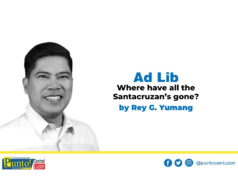OF ALL that’s been said, and continues to be said, about the habitual absenteeism of candidate Ferdinand Marcos Jr. in the presidential debates, none impacted the public’s mind more than its comparison to an apparently ardent applicant choosing to skip a job interview. A contradiction in terms, already a red flag there.
As the mere presence of all the other candidates in the debates shows the seriousness of their intent, Marcos Jr’s absence exposes his trifling take on the job on hand.
Marcos Jr. looks and acts the entitled whose name is all that’s needed to land this job, notwithstanding his putative lack of qualifications – if not patent disqualification, dearth of skills, and surfeit of failings. His direct display of disdain of the debates per se – didn’t he cry “biased” in that one moderated by Jessica Soho? – makes a complete revulsion of the democratic process of choosing leaders, argumentation and debate being essential to it.
Hence, this is an insult to the intellect of the electorate, as it is a deprivation of their right to know – of Marcos Jr.’s government platform, if any – in order to make an informed choice come election day.
As bad as shortcutting the job interview process is in the corporate world, short-circuiting it in the political realm is the absolute pits. Marcos Jr. therefore deserving of all the opprobrium consequent to his absence in the debates.
Where the job interview analogy aptly applies to Marcos Jr., it cannot, however, serve as universal template for all elective positions. Job interviews obtain, indeed, oblige, where there are vacancies. As the presidency shall soon be. All applicants should go through the wringer, so to speak, to find the best qualified for the post, the highest in the land at that!
But where there are no vacancies, as in incumbencies, job interviews cease to become obligatory.
Election debates are primarily purposed for the public to know the candidates’ intents, plans, programs, or platforms of government. Thus, debates serve the wannabes best. By their words, the electorate shall know them.
For reelectionists, however, what the debates aim to impart to the public are already amplified in their actual performance in the course of their incumbency. By their work – or lack of it – they are already known by their constituents.
The principle of res ipsa loquitur – the thing speaks for itself – comes to work here. Aye, actions speak louder than words. Or, as the dearly lamented Cong Tarzan Lazatin lived it, Ditac a salita, dacal a gawa. Performance being the ultimate basis for the electorate to make an informed choice, more so, a well-formed judgment on the day of the vote.
Res ipsa loquitur. On that score, the incumbents’ participation in debates is reduced to nothing but a virtual replay of their mandatory state-of the-province, or state-of-the-city, or state-of-the-municipality addresses, generically known as the annual Ulat sa Bayan. A repetition that could be taken by the audience as a tooting of his/her own horn, an exercise in self-aggrandizement.
Even the mere presence of the incumbents in the debates already puts them in an open season for their rival wannabes’ snide attacks, if only to cover up for their – the rivals’ – lack of qualifications or sheer incompetence. Phoned-in questions from supposed non-committed viewers are also routinely weaponized to strike at the incumbents.
Diminished into ad hominems and non-sequiturs, as most political debates descend to, with the wannabe having everything to gain and nothing to lose, the incumbent almost always suffers a great disadvantage.
In this instance, it is not cowardice therefore – as it is generally (mis)construed – for the incumbents to skip debates. It is prudence.





